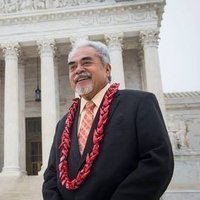Plaintiffs in the citizenship case that’s now before the Supreme Court have received support from a diverse array of academics, current and former territorial officials, and civil rights groups.
Top national law firms have filed seven “Friend of the Court” briefs asking the Supreme Court to grant review of a D.C. Circuit decision denying recognition of birthright citizenship in U.S. territories.
The lower court’s decision is based on the insular cases, a series of early 1900s decisions that the Ninth Circuit recently explained have “been the subject of extensive judicial, academic, and popular criticism.”
The lower court’s decision is based on the insular cases, a series of early 1900s decisions the Ninth Circuit recently explained have “been the subject of extensive judicial, academic, and popular criticism.”
The “Friend of the Court” briefs are by the League of United Latin American Citizens, Asian Americans Advancing Justice and the National Asian Pacific American Bar Association, Members of Congress and former governmental officials, federal and local judges, Scholars of constitutional law and legal history, Citizenship scholars and Scholars of International Law.
The briefs were filed in support of a petition for *certiorari* made on behalf of local resident Leneuaoti Tuaua and American Samoans in the United States who are classified as US nationals instead of citizens even though there were born in a US territory, American Samoa .
The petition was filed by prominent Supreme Court attorney Theodore B. Olson in the case of Tuaua vs United States.
Olson, a former US Solicitor General who has argued more than 60 cases before the Supreme Court says, “This surge of interest and support demonstrates why after more than a century of waiting it’s time for the Supreme Court to finally answer whether citizenship for people born in America’s overseas territories is a right guaranteed by the Constitution or a mere privilege to be extended or retracted by Congress based on the political winds.”
He says as the brief by elected officials in other U.S. territories demonstrates, “their collective experience shows that recognition of citizenship has not resulted in a loss of land or culture.”
Local attorney Charles Alailima, who also represents the Tuaua petitioners says, “In the face of decisions by federal judges upholding land alienation laws in both American Samoa and the Northern Mariana Islands without regard to citizenship status, it’s odd that American Samoa’s leaders are the ones arguing against precedent to suggest our laws would be struck down if American Samoans had a right to be recognized as citizens.”
Alailima opines that the position of American Samoa leaders today is 180 degrees from the position of leaders who signed the Deeds of Cession.
“It was their belief not only that they would be recognized as U.S. citizens upon the raising of the U.S. flag, but that citizenship was consistent with the continued control by Samoans of their communal lands and customs.”
Alailima says, “The territory’s courts have recognized this dynamic evolution being done by Samoans themselves and have been careful to ensure that the laws protecting Samoan custom and culture are interpreted in a manner that remains consistent with US constitutional principles and federal laws applicable to US territories.
Citizenship will not change this.”




